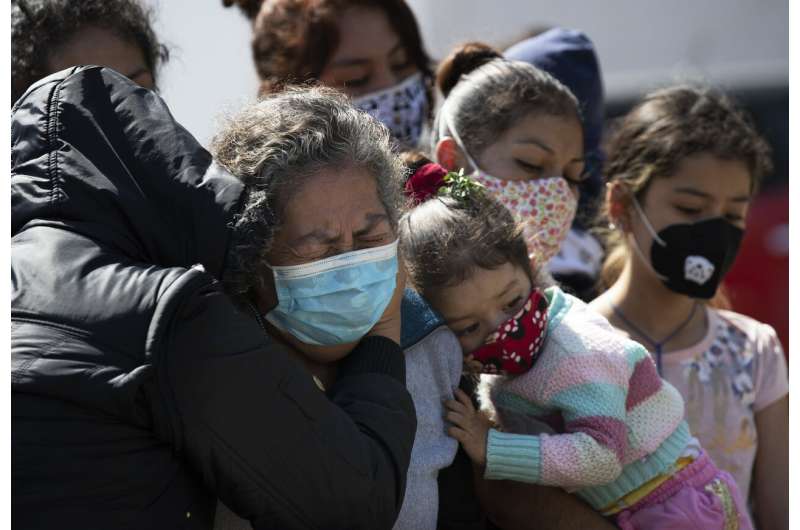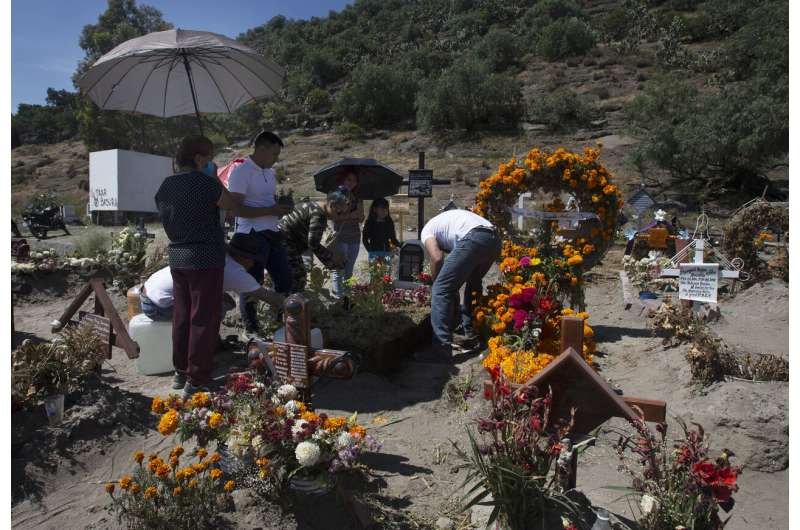Relatives bury Isaac Nolasco who died of reasons not believed related to COVID-19, in a section of the municipal cemetery Valle de Chalco amid the new coronavirus pandemic, on the outskirts of Mexico City, Sunday, Oct. 25, 2020. Mexican families traditionally flock to local cemeteries to honor their dead relatives as part of the "Dia de los Muertos," or Day of the Dead celebrations, but according to authorities, the cemeteries will be closed this year to help curb the spread of COVID-19. (AP Photo/Marco Ugarte)
Mexican health authorities acknowledged Sunday that the country's true death toll from the coronavirus pandemic is far higher than thought, saying there were 193,170 "excess" deaths in the year up to Sept. 26, with 139,153 of those judged to be attributable to COVID-19.
That is about 50,000 more deaths than Mexico's official, test-confirmed death toll of about 89,000, and about 56% higher than the previous estimate of 103,882 pandemic deaths.
Mexico has an extremely low testing rate, and officials had previously acknowledged that many people didn't get tested or their tests were mishandled. Authorities had earlier presented the estimated COVID-19 death toll of 103,882 after taking into account mishandled tests and some other factors.
But the Health Department said experts had now analyzed databases of death certificates up to late September—the latest date for which complete data was available—to come up with the latest figure of 139,153. The analysis picked up symptoms related to COVID-19 mentioned on death certificates even if they weren't listed as the cause of death.
Excess deaths are calculated by comparing the expected number of deaths from an average of previous years to those in 2020.
The department did not explain the other 54,000 "excess" deaths, but experts in other countries have suggested that more people may have died from non-coronavirus causes simply because hospitals were crowded with COVID-19 patients, or people were wary of seeking medical attention for other illnesses because they feared getting infected.
Mexico has a policy of testing only people who show serious symptoms of coronavirus infection, as well as a tiny sample of the wider population.
Relatives of Vicente Dominguez who died of complications related to the new coronavirus, place flowers on his grave at the municipal cemetery of Valle de Chalco, on the outskirts of Mexico City, Sunday, Oct. 25, 2020. Mexican families traditionally flock to local cemeteries to honor their dead relatives as part of the "Dia de los Muertos," or Day of the Dead celebrations, but according to authorities the cemeteries will be closed this year to help curb the spread of COVID-19. (AP Photo/Marco Ugarte)
© 2020 The Associated Press. All rights reserved. This material may not be published, broadcast, rewritten or redistributed without permission.
























